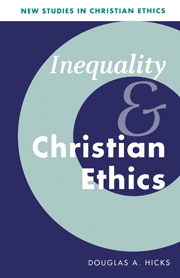Book contents
- Frontmatter
- Contents
- List of figures and tables
- Acknowledgment
- General editor' preface
- Preface
- List of abbreviations
- PART ONE CONTEXTUALIZING INEQUALITY
- PART TWO CONSTRUCTING A CHRISTIAN ETHICAL APPROACH
- PART THREE TRANSFORMING DISCOURSE, PERSONS, AND SOCIETIES
- 9 Expanding public discourse on inequality
- 10 An application: inequalities and human development
- 11 Conclusion: implications for inequality and Christian ethics
- Appendix A The Gini coefficient, inequality, and value-claims
- Appendix B Constructing Gini coefficients in income, education, and health/longevity
- Appendix C The construction of the HDI and the IAHDI
- Bibliography
- Index
9 - Expanding public discourse on inequality
Published online by Cambridge University Press: 05 June 2012
- Frontmatter
- Contents
- List of figures and tables
- Acknowledgment
- General editor' preface
- Preface
- List of abbreviations
- PART ONE CONTEXTUALIZING INEQUALITY
- PART TWO CONSTRUCTING A CHRISTIAN ETHICAL APPROACH
- PART THREE TRANSFORMING DISCOURSE, PERSONS, AND SOCIETIES
- 9 Expanding public discourse on inequality
- 10 An application: inequalities and human development
- 11 Conclusion: implications for inequality and Christian ethics
- Appendix A The Gini coefficient, inequality, and value-claims
- Appendix B Constructing Gini coefficients in income, education, and health/longevity
- Appendix C The construction of the HDI and the IAHDI
- Bibliography
- Index
Summary
REFINING THE PUBLIC CONTRIBUTION OF THIS CHRISTIAN ETHICAL APPROACH
A Christian ethical approach to inequality should provide a framework or tools for understanding the contemporary realities of disparity. Many Christian ethicists (and others) have lamented what they see as morally troubling levels of social and economic division – yet for the most part, they have not provided detailed analyses of what is going on, or how the troubling dimensions of economic life might be addressed. Christian ethics has remained at least one step removed from the empirical and policy-oriented discussions about the levels and trends of inequality. There is no simple way to account for the lack of engagement in the contemporary debate – although reasons would include a widespread view of “keeping faith apart from politics and economics,” a lack of understanding of what economic changes are really taking place, and some sort of faith in the “invisible hand” of the “free market” to make things turn out well for everyone. The modest contribution of this book is to bring the moral and economic discussions one step closer together.
What remains to be done is to return to the wide public debates about inequality and to consider the insights that a Christian ethical approach can offer within them. As these final chapters show by example, the kind of engagement ranges from broad (but carefully stated) moral arguments for “why inequality matters” and for “why Christians and other citizens should care and respond,” to more specific consideration of policy-oriented discussions about weighing the moral value of inequality alongside other factors in assessing the quality of human well-being and development.
- Type
- Chapter
- Information
- Inequality and Christian Ethics , pp. 199 - 214Publisher: Cambridge University PressPrint publication year: 2000

